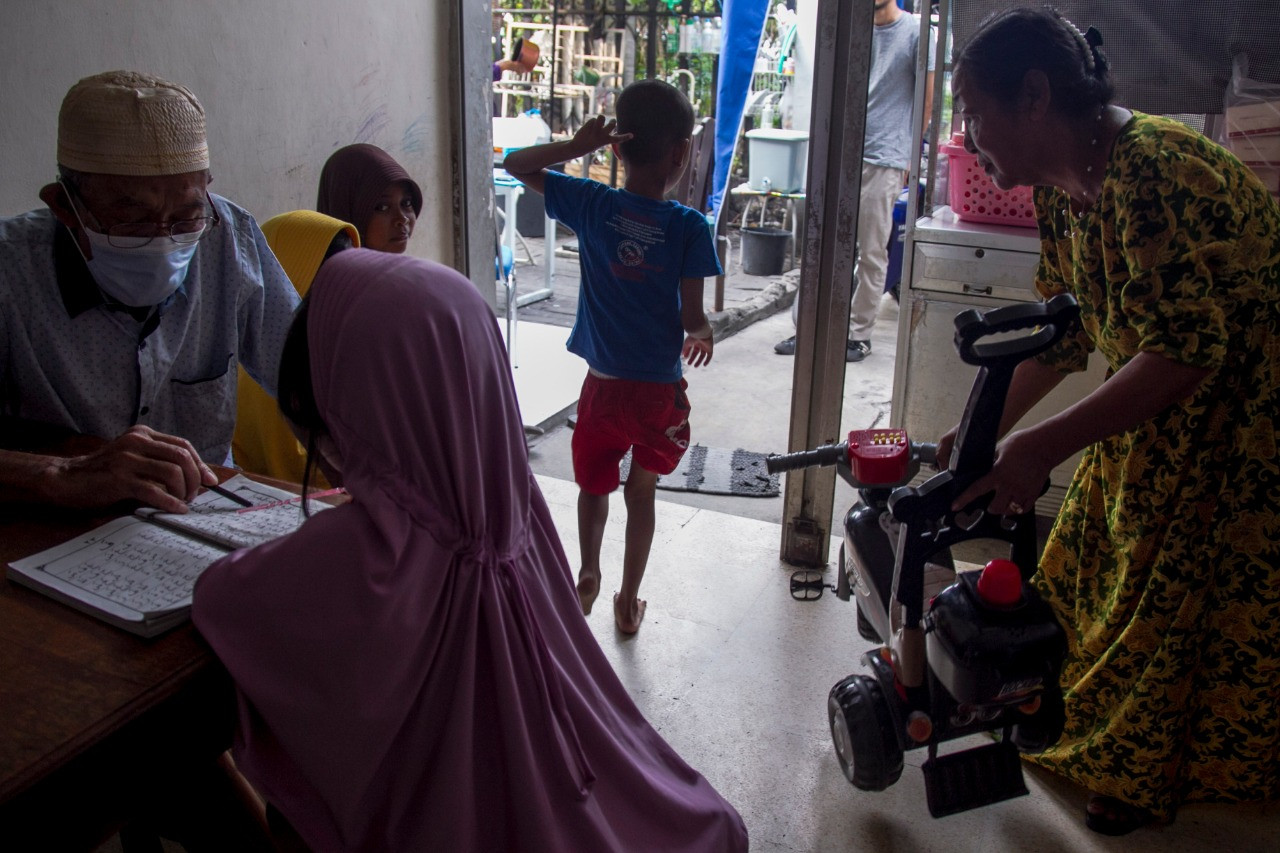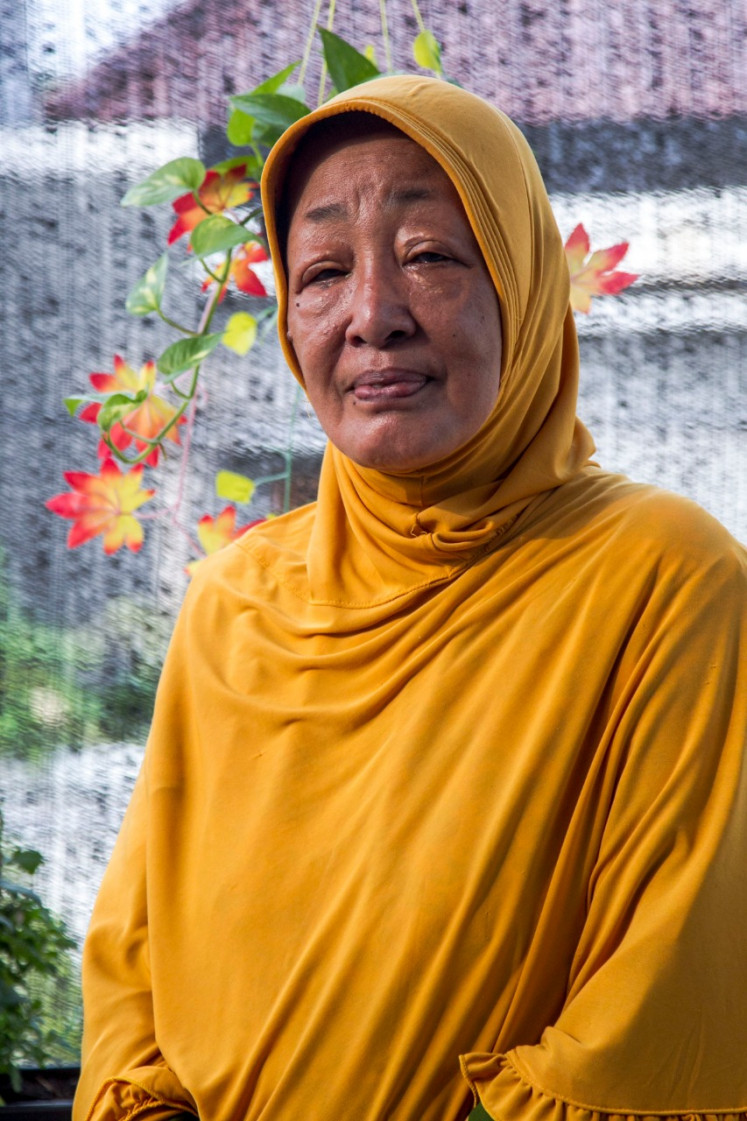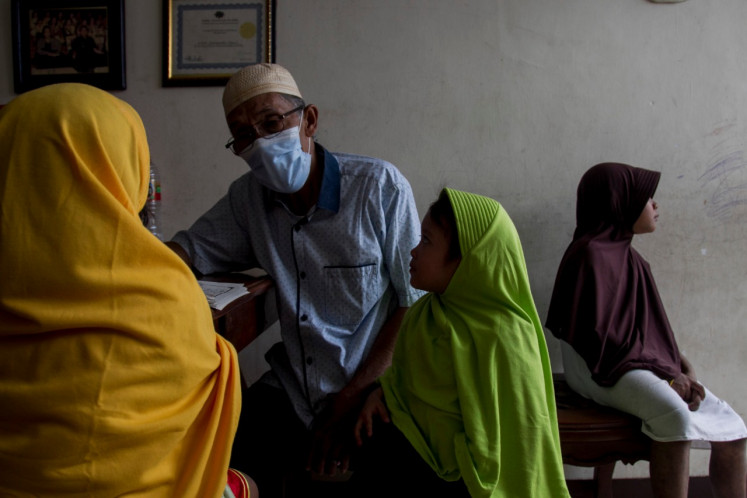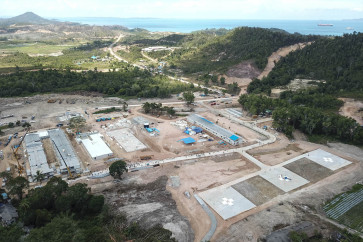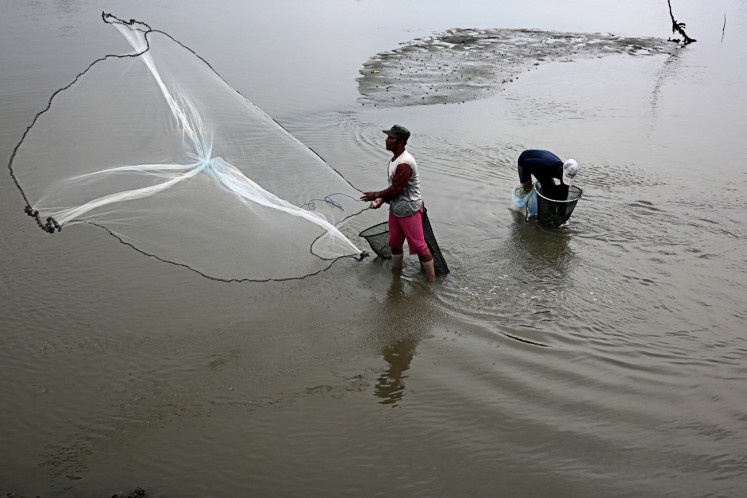Popular Reads
Top Results
Can't find what you're looking for?
View all search resultsPopular Reads
Top Results
Can't find what you're looking for?
View all search results'Mami' Vera dedicates her life to caring for people with HIV/AIDS
Liliek Sulistiowati has cared for people living with HIV/AIDS for 30 years at her Abdi Asih Foundation in Surabaya, East Java, but its finances are in dire straits amid the prolonged pandemic and is threatened with eviction.
Change text size
Gift Premium Articles
to Anyone
T
he paint on the house with the black fence looks peeled and weathered, ravaged by time. But within those walls are merry children creating a boisterous atmosphere. Founder Liliek Sulistiowati of the Abdi Asih Foundation, a shelter for children living with HIV/AIDS, often sits with the children, watching them play.
When The Jakarta Post visited the home in the last week of April, however, things suddenly went from calm to tense. A household assistant screamed, breaking Liliek's serene gaze, and reported that a child had gone missing. Liliek immediately began calling the child's name, but there was no answer. Hastily, she mounted her motorbike and drove through the village, looking for the missing child.
"Oh no! That child has to take medicine later at 7 p.m. I'm dead," she said, holding back tears.
The tension lasted around two hours. Luckily, a neighbor spotted the child playing in a park 1 kilometer away. Liliek rushed there, crying as she embraced the child.
"Mama's heart was about to stop, you know. Alhamdulillah (blessed be God),” said Liliek. “Now, off you go, it's time to take a bath,” she told the child.
Affectionately called “Mami Vera” among those who know her, Liliek has been providing a safe space for people with HIV/AIDS since 1987. She has moved from place to place for the last 30 years due to various problems: home evictions and the increasingly stifling cost of rent.
Liliek decided to dedicate her life to caring for people living with HIV/AIDS after she witnessed a violent event that still haunts her day and night.
Standing up against inhumanity
Surabaya was experiencing a long dry season in 1987. The hot sun seared the asphalt roads. One afternoon, Liliek was sipping coffee at a shop located in the popular Dolly area, which turned into an infamous red-light district at night, when the calm moment was shattered by a woman’s screams.
“I saw a woman being dragged along the hot asphalt by two burly men. I spontaneously cried out and went toward them. I said something like, 'She's a human being, not a goat! Release her, you beasts!’” she recalled.
The two men released their grip on the woman's hair. Then, one of them opened his jacket to reveal the uniform of a civil servant. "Who are you?" he asked. Liliek replied that she was “no one”, but that she didn't like the way the two men were treating the woman.
"Take off your [uniform]. Let me trample it. What if your mother or your wife were treated like that? You want that?" she said, and then one of the men punched her in the mouth. She fell down.
This was followed by a flurry of kicks to her face that knocked out almost all her teeth. Liliek was rushed to a hospital where she received intensive care treatment for several weeks.
"But that incident opened my eyes that women were being threatened in the red-light district. From that day on, I promised myself that I must help my people. Help women," she recounted.
After delving deeper into the issue, she found turned out that violence was not the only risk that sex workers faced. The lack of sex education meant that they were vulnerable to HIV/AIDS.
So Liliek founded the Abdi Asih Foundation, named after her husband who had died three years earlier, which is a safe house for PLWHA today, around seven years after Indonesia’s largest red-light district was closed down in 2014.
Fighting stigma
Liliek has experienced all the ups and downs of caring for people with HIV/AIDS, including children. The lack of public awareness about the virus and disease often hampered her efforts. She has had to be constantly on the move from being thrown out of a residential area, because the residents were afraid they might catch HIV/AIDS from the children at the shelter.
"I once rented a house, which I paid in advance. I was ready to move in. It turns out that the owner found out that the house would be used to accommodate PLWHA. My money was returned and [the rental contract] was cancelled. My previous [rental contract] was nearing its end. The children had no option but to live on the streets. I couldn't help but cry," she recalled.
A lifetime vow: Mami Vera said that she will never leave her foster children until the day she dies. (Jurnal Dolly/Courtesy of Bintang C. Putra )Luckily, she bumped into one of her former landlords, who offered her a house on Jl. Dukuh Kupang Selatan. This is where she and the Abdi Asih home are located to this day.
The social stigma Liliek experienced is similar to what PLWHA live through every day.
Public education was the only cure, she said. The stigma was a real threat to the PLWHA she fostered. One occasion that stuck out in her head was when a group of kampung residents almost burned down the house of a PLWHA.
"The residents had gone around and bought gasoline and torches. It was in broad daylight. A friend called me in a panic. ‘Someone is going to be burned alive. Come here, hurry!'” she recalled.
“Luckily, the place was close by. When I got there, the residents had already surrounded the house. I stood in front [of the house]. I didn't care if I was also burned, I had to try,” said Liliek. "Just a little [later] and it would have been [burnt] to ashes. It smelled like gasoline already. I was standing in a pool of gasoline.”
The incident began when news spread that a woman living in the kampung had been exposed to HIV/AIDS. The other residents grew worried that they would also be infected, so they had ganged up on her in an attempt to expel her from the kampung. She refused to move, however, because she had lost her livelihood. This enraged the gang of residents, who then planned to burn her house down.
Threat of expulsion
Liliek keeps busy these days in caring for seven toddlers at the Abdi Asih Foundation. Meanwhile, she is also supporting three families who lived not far from her shelter. She gets her supply of medicine from the local health office, while she sells nasi bungkus (wrapped rice meals) to meet her daily needs.
Her say begins at 1 a.m., when she cooks and prepares nasi bungkus for selling at nearby stalls. She has received several large orders from generous people in the past, but her income has fallen significantly since the pandemic emerged.
"I only have enough income for a meal. I can't save, let alone pay for rent,” she said.
Teachings for free: An ustadz routinely teaches the Abdi Asih Foundation foster children how to read and recite the Quran, all for free. (Jurnal Dolly/Courtesy of Bintang C. Putra )In addition to providing for herself and the children under her care, Liliek also supports three families that live at the home, which costs at least Rp 6 million (US$415) per month. Even though her finances are tight, she remains dedicated to responsibility supporting the PLWHA families.
Abdi Asih Foundation was again in danger of being evicted at the end of April, if Liliek was unable to pay the rent.
Liliek does not know who to ask for help. She has already sold her belongings to survive, and she is not currently receiving any donations from anyone.
Liliek is now 60 and is not as physically active as she once was. She has no other means of making ends meet aside from selling nasi bungkus, but hopes to buy a house before she dies so the people in her care will at least have a place to stay.
"That way, I could rest easy in the afterlife. I wouldn't be anxious about how my children are living. But I can't even pay for [rent], never mind owning a house,” she said.

